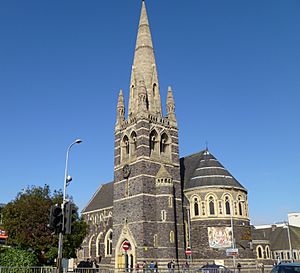St Mark's Church, Leicester facts for kids
Quick facts for kids St Mark's Church, Leicester |
|
|---|---|
 |
|
| 52°38′34″N 1°07′42.4″W / 52.64278°N 1.128444°W | |
| Location | Leicester |
| Country | England |
| Denomination | Church of England |
| History | |
| Dedication | St Mark |
| Consecrated | 25 April 1872 |
| Architecture | |
| Heritage designation | Grade II* listed |
| Architect(s) | Ewan Christian |
| Groundbreaking | 1870 |
| Completed | 1872 |
| Closed | 1986 |
| Specifications | |
| Length | 99.5 feet (30.3 m) |
| Nave width | 31.5 feet (9.6 m) |
| Spire height | 168 feet (51 m) |
St Mark's Church is a historic former church in the city of Leicester, England. It is a Grade II* listed building. This special status means it is considered a very important building in England's history and must be protected.
For over 100 years, it was a parish church for the Church of England. Today, it has a new life as a place for events.
Building a Landmark
The story of St Mark's began in 1870 when the first stone was laid. The church was a gift from a man named William Perry-Herrick. He hired a well-known architect, Ewan Christian, to design the beautiful building.
Several companies from Leicester worked together to build it. The tall spire, reaching 168 feet high, made it a famous sight in the city. The church officially opened on St Mark's Day, April 25, 1872.
Special Features Inside
St Mark's was known for its amazing art and details.
- Stained Glass: When the church opened, it had colourful stained glass windows made by a company called Ward and Hughes. More beautiful windows were added later by famous artists like Henry Holiday and Charles Eamer Kempe.
- The Apse Painting: The apse, which is the curved area at the front of the church, had a huge painting. Created in 1910 by James Eadie Reid, it was called “The Triumph and Apotheosis of Labour.”
- The Organ: A large pipe organ was built for the church in 1871 by William Hill & Sons.
- Bells and Clock: The church bells were made by Taylor of Loughborough, a famous bell-making company. The clock was made by Moore of London.
A New Chapter for St Mark's
By the 1980s, fewer people were attending the church. In 1986, the Church of England decided it was no longer needed for regular services. This is sometimes called being made "redundant."
The building stood empty for many years. Then, in 2005, it was carefully restored and transformed. It became The Empire Banqueting Hall, a popular place for weddings, conferences, and other special events. This gave the historic building a new purpose and made sure it would be enjoyed for years to come.
 | Leon Lynch |
 | Milton P. Webster |
 | Ferdinand Smith |

